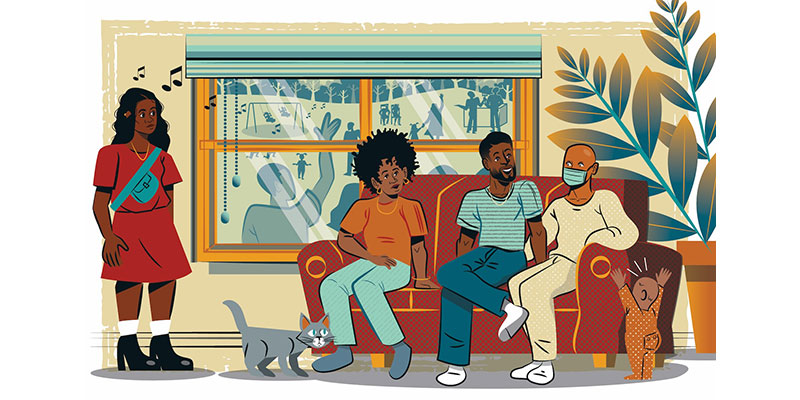New Ways to be Present
contributed by Audie Shushan
How to navigate celebrations, holidays and times of transition during treatment.

stration: Justine Ross
When Lydia Elya, LCSW, talks to her patients around the holidays, many express a similar sentiment: “A lot tell me: ‘My kids are home, and it’s the holiday time, but it doesn’t feel special, or it doesn’t feel happy, because I’m sick, and I’m not able to do a lot.’”
Elya, a medical social worker at Rogel, explains that while school breaks, holidays and celebrations like graduations and weddings can be occasions of joy and community, they are also often emotionally, logistically and physically challenging for people with cancer and their loved ones.
Elya encourages patients and their caregivers to experiment with new ways to be present during special occasions. “Especially for people who are used to making these occasions really special for their families, that feeling of being disconnected and not being able to participate and make celebrations like they used to be is really challenging emotionally.”
This is a time to find meaningful but less draining ways of engaging. For people who are used to planning and running the show, this is your opportunity to supervise. You may not be able to do all the cooking, but you can still be in the kitchen, offering perspectives and sharing recipes. That picture-perfect camping trip or beach vacation may not be in the cards this year, but you can set up extra playdates for kids home on break or pull in friends and family members to take kids on special outings.
Most of all, give yourself some grace through these times. Elya says this last part is vital: “You have a cancer diagnosis. You're going through treatment. You are not going to be who you were last year at this time.”
Here are five ways Elya suggests dealing with the logistical and physical challenges of holidays, celebrations, summer break, and other transitional times:
- If you’re traveling, check in with your provider first. Share your plans and your hopes for this trip. Your provider will be able to talk with you about the feasibility of travel. For situations where there will be a lot of people present, your provider may suggest you not attend or that you wear a mask, or stay only for the outdoor portion. If you do travel, make sure you have all your medications with you and plan to connect with a local pharmacy . Find out locations for the nearest urgent care and ER.
- Scheduling around the holidays or summer vacations can be complex, but don’t let this stop you from reaching out to the clinic. Even if your provider is away, there will always be someone managing the phones who can field your questions and concerns. Elya says, “I think some patients feel like, ‘I don't want to be a bother. It's over the holidays.’ No. Your quality of life is just as important.”
- Keep your medical team informed of your symptoms. Dizziness, nausea and difficulty sleeping can worsen with the holidays or transitional times. Share this information with your medical team, as there may be avenues for managing these that haven’t been explored yet.
- Be mindful of energy conservation. During these times, you are likely experiencing more fatigue. Events like the holidays, travel, graduations and weddings are significantly taxing to your system, so you might need more days to recover after the event.
- Remember that it can be very difficult for patients in the thick of treatment to know exactly what they need or to ask for it. If you are a friend or family member, offer to make a care page or a text chain. Drop off groceries. Provide meals. Help get the kids to and from school. Stop by and assist with laundry or other household tasks. Is there a neighbor who can help mow the lawn or clear the gutters? Loop them in.
Continue reading the 2024 issue of Thrive
